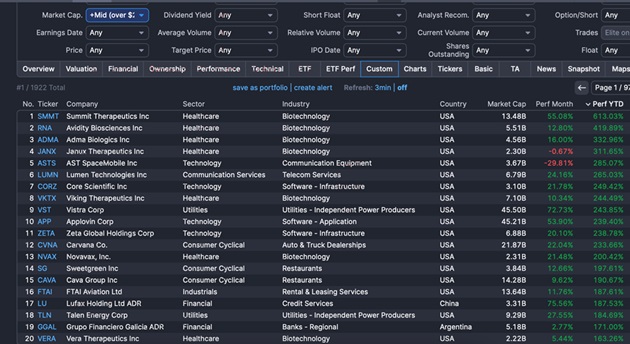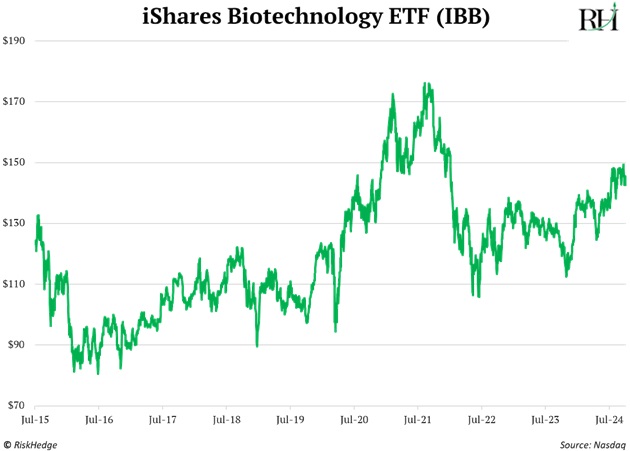Most investors are unaware of the huge breakthroughs happening in biotech right now.
The last 30 years has been a story of slow and steady progress. Cancer death rates in the US have declined 30% since 1990. Heart attacks and strokes have seen a 75% decline.
Now, we’re on the cusp of a biotech revolution.
Dario Amodei, the CEO of Anthropic—and creator of artificial intelligence (AI) tool Claude—predicts we could squeeze a century’s worth of biotech progress into the next 5–10 years.
I agree!
Today, I’ll tell you about the most exciting biotech breakthroughs—plus the dirty little secret to biotech investing.
1. Imagine if beating cancer was as easy as getting a jab in your arm.
Moderna (MRNA) and Merck (MRK) designed a shot to treat melanoma—the deadliest form of skin cancer.
Patients who took it during trials were half as likely to die or have their cancer come back after three years, compared to normal treatments. That's not just a statistic, it's hundreds of thousands of lives saved.
Researchers from the University of Florida also created a cancer vaccine to attack glioblastoma, the most lethal form of brain cancer. A disease which kills its victims in 15 months, on average.
The vaccine taught the patients’ immune systems to see tumor cells as a dangerous virus and attack. Within 48 hours, the brain cancer was in retreat!
Cancer kills 600,000 Americans every year. Thousands of people walk into a doctor’s office only to be told, “There’s nothing we can do.”
mRNA (messenger RNA) technology can turn cancer from a death sentence into a mere nuisance.
Remember, “mRNA” is the tech that helped scientists develop a COVID vaccine in record time. Please, don’t hate mRNA because of how governments + big pharma forced these vaccines on us.
mRNA really is a game-changing tech with incredible promise. For cancer, it can prime our bodies to seek and destroy solid tumors not easily cured with surgery, and without the nasty side effects of chemo.
These cancer-killing jabs are only in the trial phase. But the results are extremely promising.
What’s even more promising is mRNA vaccines for pancreatic… colorectal… metastatic… and lung cancer are all showing positive results in trials, too. What if mRNA is the “skeleton key” that helps us cure every cancer?
I love how my friend Matt Ridley describes mRNA: “Synthetic messengers that reprogram our cells to mount an immune response to almost any invader, including perhaps cancer, can now be rapidly and cheaply made.”
I often worry about getting sick and not seeing my kids (and grandkids) grow up. Maybe you do, too.
It’s great to see breakthroughs that could one day mean all you have to do to beat cancer is get a shot in your arm.
3. A blind kid in Miami can now see thanks to these new eyedrops.
Antonio had multiple surgeries to restore his sight. They all failed.
As a last hope, doctors gave the 14-year-old a special kind of gene-editing eyedrops.
Often referred to as “CRISPR,” gene editing allows scientists to “cut” out bad genes that cause disease and replace them with healthy ones. It's like fixing typos in the book of life.
Gene therapy was invented around a decade ago. After years of scientists toiling away in labs, we’re finally seeing real breakthroughs.
Antonio’s doctors essentially infused regular eyedrops with CRISPR technology. He took them once a month for about a year, and now he can see for the first time ever. Woah!
This tech will allow kids who’ve stared at darkness their whole lives to enjoy movies and play tag.
Deadly diseases from breast cancer to Alzheimer’s are caused by a few rogue genes. By editing a handful of genes, we could all but eliminate today’s biggest killers.
The first-ever gene editing therapy was approved in America and the UK late last year. It’s already curing kids of awful sickle cell disease.
And earlier this year, Harvard scientists gave five kids who were born deaf a special “gene-editing” jab in their ears. Within a few weeks, they could hear their parents calling their names and were dancing to music.
I hope my son asks me someday, “Dad, what was deafness?”
3. Scientists are on the cusp of achieving a Holy Grail…
A blood test that detects Alzheimer’s at a very early stage, before any “senior moments.”
Researchers in the UK built a ChatGPT-like AI model to sift through 1,500 blood markers. They were able to predict Alzheimer’s with 90% accuracy… nearly 15 years before people were diagnosed… all with a routine blood test.
By the time we catch Alzheimer’s today, it’s almost always too late. Early detection means patients could be treated with the first Alzheimer’s drug approved by the FDA last year.
Eli Lilly’s (LLY) “Kisunla” isn’t a cure, but it’s the next best thing. It slowed cognitive and functional decline by up to 35% after 18 months in trials.
Early warning systems + new drugs = possibly turning the tide of the miserable disease that is Alzheimer’s.
We haven’t even talked about GLP-1 drugs like Ozempic. Which, along with melting fat off waistlines, is slashing the risk of heart attacks and strokes and guarding against dozens of cancers.
Or how ChatGPT-like AI tools are helping us discover new life-saving drugs in record time.
We’ve barely scratched the surface of what’s possible when it comes to biotech. Get ready for some wild breakthroughs like AI-powered factories cranking out personalized cancer vaccines.
4. Here’s the dirty little secret to biotech investing…
Biotech is the ultimate stock picker’s market. Which stocks you own really matters.
Pull up a list of the best-performing stocks in a given year. Biotech stocks always dominate. Take a look below: +613%, +420%, +333% ... the list goes on.

Yet, the largest biotech ETF—the iShares Biotechnology ETF (IBB)—has been a dud over the past decade. It’s flat, while the S&P 500 has more than doubled:

What’s the deal? Biotech companies spend a ton of money on research and development. The average biotech company loses money and never makes a breakthrough. When you buy a biotech ETF, you’re buying a big blob of average.
I suspect that the breakthroughs happening now will light a fire under the whole sector, simply because they’re so numerous and powerful.
PS: To learn more about the exciting breakthroughs happening in the world of medicine, consider signing up to The Jolt today. I regularly discuss new biotech breakthroughs—and the best ways to invest in them—in my weekly issues, published every M/W/F.


